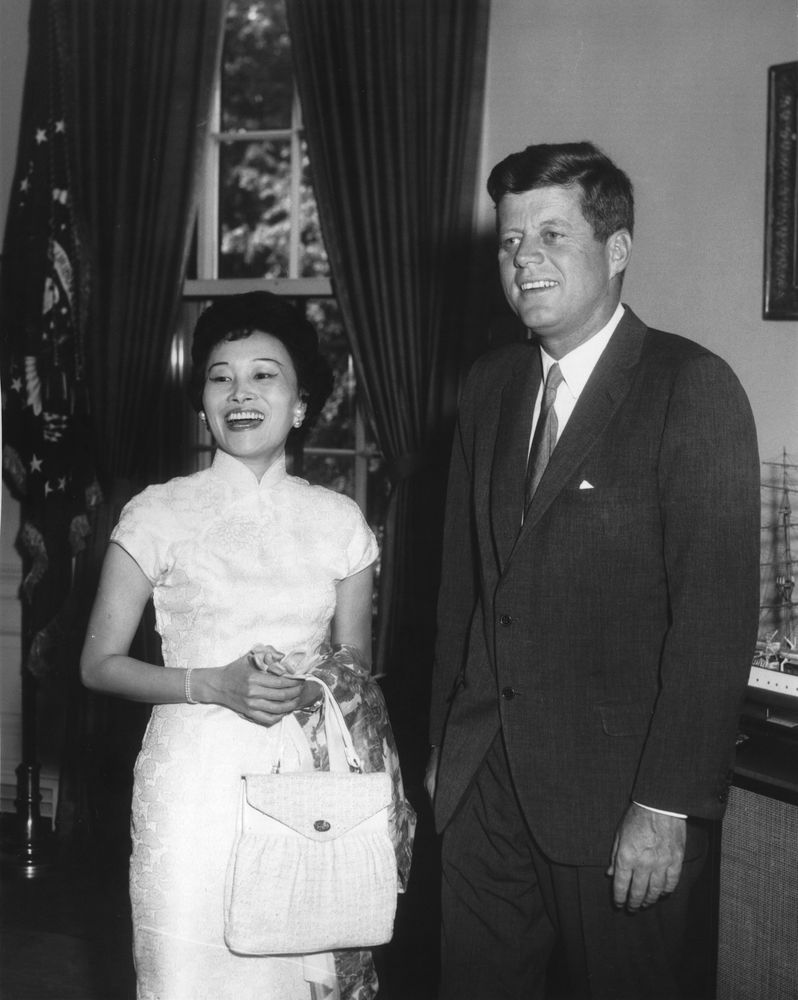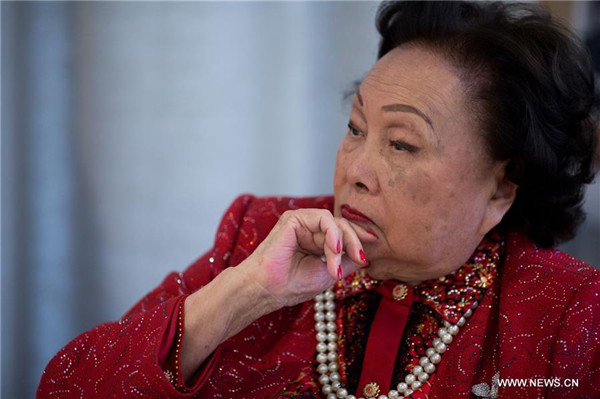Legendary 'Flying Tigers' widow, Anna Chennault, dies at 94
By ZHAO HUANXIN in Washington | China Daily USA | Updated: 2018-04-04 22:46

Anna Chennault, a legendary figure in US-China relations and widow of US General Claire Lee Chennault, the leader of the "Flying Tigers" air squadron, died on March 30 at her home in Washington DC. She was 94.
Families and friends of Chennault, who was born Chen Xiangmei in Beijing on June 23, 1923, remembered her as a highly respectable person who cherished fond memories of her hero husband and kept alive his legacy in building on the bond between the people of the two countries forged during tough times.
Chennault had complications from a recent stroke, said her daughter, Cynthia Chennault, The Washington Post reported on Tuesday.
She was also survived by another daughter, Claire Anna Chennault; three sisters; and two grandsons.
Chennault last attended official events in China in September 2015, when she was invited to the V-Day celebrations in Beijing.
She was awarded a medal by President Xi Jinping to honor the late General Chennault, who led the American Volunteer Group to help China drive out invading Japanese troops. The group, called the Flying Tigers by the Chinese for their courage, was formed in 1941.
In China, and in Chinese communities worldwide, "Flying Tigers", Chen Xiangmei and Chennault have been household names for decades.
The first female reporter for the official news agency of China in the 1940s, Chennault met General Chennault in Kunming. The two married in Shanghai in 1947 after his divorce. She moved to Washington DC after the general died in 1958.
She would later recall their 11-year marriage during a trip to China: "A person always needs love. The 11 years of the marriage with General Chennault was the most precious time in my life. Though he left us a long time ago, I still miss him," she said, according to a report posted on china.org.cn on April 14, 2010.
"When my grandfather passed away, Anna could have been content just to return to her home country, but she decided to stay and continue the legacy that General Chenault had started in 1937," said Nell Chennault Calloway, president of the Chennault Aviation and Military Museum in Monroe, Louisiana.
Chennault stayed true to her mission to serve both China and the US, Calloway, step granddaughter of Anna Chennault, told China Daily.
"I am very sure she went through many struggles as a young widow with two small children. Her accomplishments are truly remarkable and a role model for many struggling young widows," she said.
"She was a very good person to be able to honor my grandfather's memory and his legacy and continue to work to build a relationship between China and the United States," Calloway added.
"I think that's the most important thing that I truly respected in my heart for doing that."
Douglas H. Paal, vice-president for studies, Asia Program, at the Carnegie Endowment for International Peace in Washington, said the Flying Tigers have a romantic image in the American memory, being brave airmen helping China in dire straits against their common enemy at the time, Japan.
"She and the late Senator Ted Stevens sought to keep the memory alive because of their personal participation during the war," Paal said.
Frank Wu, chairman of the Committee of 100, said General Chennault had an important role in modern Chinese history and Mrs. Chennault was very much part of that legacy.
"Mrs. Chennault was a legend in her own time; few achieve such status," Wu told China Daily in an email. "She was that extraordinarily rare private citizen who could serve as a diplomat. She was known to all and respected by all."
Chennault joined the New York-based non-governmental organization in 1991. Expressing its sympathies for her passing, the committee said in a statement, "Everyone working on US-China relations was aware of her. Her death marks the end of an era."
Over the years, Chennault had become one of the most influential private citizens in the nation's capital. She was renowned for having the ear of many presidents and for her influence on foreign policy, the statement said.
At the end of 1980, shortly after Ronald Reagan was elected US president, she was sent to Beijing as a special ambassador to meet with Deng Xiaoping. The next year, she established the Chen Hsiang-mei Education Prize in more than a dozen cities in the mainland.
She had since visited the mainland frequently and was an active player in promoting cultural exchanges between China and the US, as well as across the Taiwan Straits, according to earlier Chinese media
reports.huanxinzhao@chinadailyusa.com

























